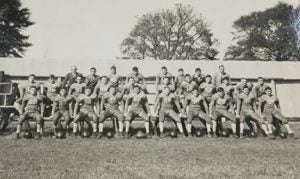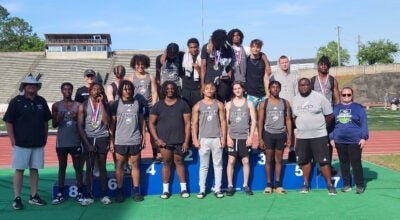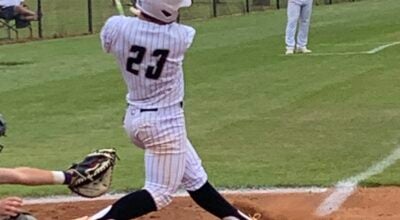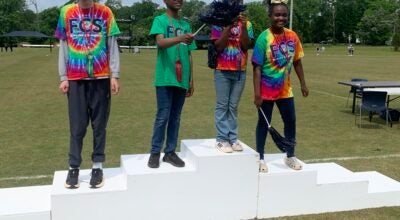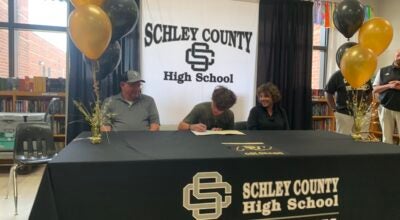A conversation with Bill Parsons, a member of the 1944 Americus High School state championship football team
Published 2:20 am Tuesday, November 6, 2018

- 91-year-old Bill Parsons is one of the few members of the 1944 Americus High School State Championship Football Team that are still living. Photo by Ken Gustafson
AMERICUS – Many people in Americus will have fond memories of the 2000 and 2001 Americus High School football teams who won back-to-back state championships under former head coach Erik Soliday, and rightly so. However, many years before, there was an Americus High School football team that won a state championship in 1944. Most of the members of that team have passed on, but some are still living. One of them is Bill Parsons, who played center, full back and linebacker on that great team.
Parsons, 91, was born on August 7, 1927, in Americus to William Oscar Parsons and Mabel Parsons.
Bill Parsons, like many other great football players, was introduced to the sport at a young age and in a rough way.
“I reckon I’ve had a lot of bumps along the way,” Parsons said. “I grew up on 503 W. Church Street. On the weekends, we’d get out and play touch football in the pasture. I got introduced to football right there. The big boys would give me the ball and let me run with it. I was running near a barbed-wire fence. Another guy pushed me into the fence, I ended up having to go to the doctor to get sewed up.” Parsons went on to say that he played football in junior high. “They had six-man football back then,” Parsons said. “From there, I moved over to high school. Mr. Jack Finklea was the head coach.” According to records obtained from the Georgia High School Football Historians Association (www.ghsfha.org), Jack Finklea coached at Americus High from 1937 to 1944 and compiled a record of 34-11-2, including winning the state championship in 1944. That team went 10-1 that season.
Parsons played football at Americus High School from 1942-44. Parsons said that when he showed up to play football in high school, Coach Finklea didn’t know where to play him. “It was in 1942 or 43 when I started out. He put me at guard, and I got into one ball game that year,” Parsons said. “I didn’t know what the heck I was doing anyway.” Parsons said that he was a sophomore back then. Parsons’ wife, Lucy Parsons, said that back then, they only went up to 11 grades. “Next year, Mr. Finklea played me at center because I was the only one that could snap the ball between my legs and get it back to the back man, especially on punts,” Parsons said. “I had to do it on all the punts. There was another fellow, John West Sheffield. He was the other center that we had, but he didn’t play center too much because I was a junior and Sheffield was a year behind me.”
Parsons went on to say that the Sheffield family had a hardware store here in Americus, which had been here for a long time. “He (Sheffield) had a younger brother that was playing ball with us also: Lang Sheffield,” Parsons said. “Lang didn’t get around to playing as much ball as we did because he wasn’t as big.”
Parsons said that Coach Finklea gave him the nick name “Poker Face”. Parsons said that he asked Finklea why he called him Poker Face. He said that Coach Finklea told him “When I look at your eyes, it’s like a man that’s playing Poker. I don’t know what you’re going to do. I don’t know if you’re thinking about hunting, or whether you’re out here on the football field.”
However, based on his performance at Americus High and beyond, when it was time to play football, Parsons was ready and dialed in. Parsons’ wife Lucy said that whenever Bill wasn’t playing football, he was down at the creek fishing and hunting. She thinks that may be the reason Coach Finklea gave her husband the nick name “Poker Face”. “You had to have known Jack Finklea,” She said. Mrs. Parsons went on to say that Bill, along with some of his teammates, took Coach Finklea hunting and fishing on certain occasions when they were in high school.
Parsons went on to say that as the upcoming 1944 season approached, World War II was going on, and it was hard to get gas. “Everybody had to gather up gas stamps together so we could buy enough gas to go to the games in automobiles. We didn’t have a bus, so we used automobiles,” Parsons said. “We played a ball game in Cordele, and I had made the comment to coach one day before practice started. I was joking with him, but I half-way meant it. I told him, ‘Mr. Finklea, you’re playing your best backfield (full back) man up on the line’.’ He says, ‘Who’s that?’ I said, ‘Me’. He said, ‘My gosh, you’ve got to be kidding me.’ He told the assistant coach, Ken Carpenter, about me saying something about playing in the backfield,” Parsons said. “Coach Finklea told Carpenter that I was the only center the team had and that I needed to stay there. He didn’t want to put me in the backfield.” Parsons went on to say that Ken Carpenter would later become Superintendent of Sumter County Schools.
According to ghsfha.org, Americus began the 1944 season by defeating Eufaula (AL) 13-0. Their next game was against Cordele. “We played Cordele twice that year,” Parsons said. “We had already won the game and we had a big lead, so they put me in the backfield. I was a single wing. That’s what we ran back in those days.”
Americus went on to beat Cordele 46-14. In addition to playing full back and center on offense, Parsons also played linebacker on defense. He alternated at the center position, but on punts, he was the guy to do the long snapping. “He (Coach Finklea) wouldn’t let anybody else get up there and snap it,” Parsons said.
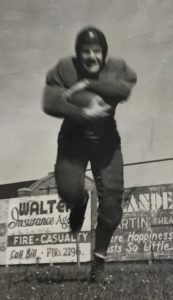
Bill Parsons played center, full back and linebacker on the 1944 Americus High School state championship football team.
Submitted Photo
In the second meeting between Americus and Cordele during the 1944 season, Americus won that game 28-6. At that point, they were 3-1. Americus won six games in a row before making it to the state championship game. One of those wins came against Albany. According to an Americus Times-Recorder article written during that time, the Panthers had not beaten Albany in 13 years. The Panthers finally ended the 13-year drought by defeating the Indians 27-0. The name of the article was “13-year Jinx Is Broken by Finkleas’s Men.” The only loss the Panthers sustained during that season was to Valdosta by the score of 19-7. That took place on October 6, 1944. “We had lost a game and Valdosta had lost a game during that season. We were tied,” Parsons said. “We had to have a playoff between the two of us. Mr. Finklea flipped a coin and we won the coin toss. We played the ball game in Americus. We beat Valdosta the second time we played them.” According to ghsfha.org, Americus won that playoff game against Valdosta by the score of 20-6. “This allowed us to play LaGrange for the state championship in Class B,” Parsons said. “LaGrange was undefeated, and we were playing them for the state championship.” Back then, there were two classifications: Class A and Class B. Americus faced LaGrange in the 1944 Class B State Championship on December 1, 1944, at Hugh Mills Stadium in Albany, and won that game 25-18. “The temperature was 18 degrees at night,” Parsons said. “We were not use to that kind of weather.”
Parsons said that he had a lot of great memories playing high school football, but one memory stood out in his mind. “When we went to Tifton, GA to play Tift County, we were supposed to run over them without any problem,” Parsons said. “At halftime, the score was 0-0. Mr. Finklea came into the dressing room and he was so upset and emotional about it. He said, ‘I can’t talk to these boys. Ken (Coach Ken Carpenter), you go talk to them.’ Mr. Carpenter talked to a couple of linemen, and that was all the talking we got at halftime. We went back out on to the field and we beat them 33-0. We had a good second half. We couldn’t do anything during the first half.”
Parsons went on to say that after he graduated from high school, he was practicing with the Auburn football team four days later. “I turned 18 on August 7, 1945,” Parsons said. “After I graduated from high school, I had agreed to play ball over at Auburn. They gave me a scholarship. I was offered a scholarship to Georgia Tech. The University of Georgia said that I was too little. Tulane University also wanted me, but I didn’t go there. I turned Tech down because I didn’t have enough sense in my head to go up to Georgia Tech, but I went to Auburn, and the draft was breathing right down my neck.”
Parsons went on to say that one of his teammates, Felton Luck, went to Auburn with him. “Felton was a tackle on our ball club, and he had a scholarship to Auburn,” Parsons said. “The Navy offered us a chance to join the Navy Reserves for the duration of the war, and then six months afterwards, we could be released. I went to Auburn with that hanging over my head. I graduated from high school in May, and four days later, we were practicing football over at Auburn.” Parsons went on to say that back then, they allowed the colleges to practice earlier because so many men were disappearing from the camps. “They were being enlisted or they volunteered or they got drafted,” Parsons said. “Practice went on for about four weeks. It was pretty rough for us right out of high school. We were playing college football four days after leaving high school,” Parsons said.
Parsons said that he left Auburn after one semester and went into the service with the Navy Reserves. “I went through boot camp in Williamsburg, VA,” Parsons said. “From there, they put me on a troop train and we went across the country to San Francisco. They put me on a ship and I ended up in China. I stayed over their doing what they called “Boat Poole”. We served the ships that came in to the harbor. They offered me a chance to sign up with the regular Navy, and I told them ‘No, I think I’d rather put my feet under Mama’s table at 503 West Church Street’, so that’s what I did.”
Once he returned from the service, Parsons went back to Auburn, but failed to meet the academic requirements. “I ended up coming back home and going to Georgia Southwestern. In 1948, the boys talked me into going down to Douglas, GA where Southwest Georgia Junior College (now South Georgia State) was,” Parsons said. “I went down there for four quarters and I played football down there. In 1948, we won the Little Sugar Bowl. In 1949, we were picked to go out to the Little Rose Bowl, but Tennessee Wesleyan beat us and knocked us out a chance to go to the Little Rose Bowl. It was the worst officiated ball game I’ve ever been a part of. We had bad officiating. I coached and I played. It was the worst ball game I have ever seen.”
Parsons played for Wyatt Posey, the Head Coach at Southwest Georgia Junior College at the time. “I was playing linebacker primarily,” Parsons said. “I played some offense down there, but not a whole lot. In 1949, we had a pretty good season. I think we only lost one or two games. We played in the Turpentine Bowl in Valdosta that year, and we got beat by a team from Mississippi.”
After the Turpentine Bowl was over, according to Parsons, the coach of the Mississippi team recommended that Parsons, along with five of his teammates, go out to the University of Tulsa and play football there. “I had a chance to go to Florida, but I didn’t go there,” Parsons said. “I had a chance to go to Miami but didn’t go there. I didn’t go to Georgia because they said I was too little, so I went to Tulsa for my junior and senior year.”
Parsons played for Tulsa Head Coach Buddy Brothers, who coached the Golden Hurricanes for seven seasons (1946-52) and compiled a record of 45-25-4. Parsons played at Tulsa during the 1950 and 1951 seasons. “During my junior year, I got my foot broken and I missed the last four ball games,” Parsons said. “During my senior year, we had a good ball club out there. Georgia had held the record for total offense (passing and running) in a season from 1942-1950. In 1950, Tulsa broke that record. The next year, we broke all records for total offense.” Parsons went on to say that he was very fortunate to have had two very good backfield coaches. “I had Jack Mitchell, who earned All-America honors at Oklahoma, and I had Darrell Royal in the secondary,” Parsons said. Royal would go on to be one of the greatest college football coaches in the history of the game. He led the University of Texas to three national championships (1963, 1969 and 1970). Parsons said that Coach Royal use to call him “Stump”. “I asked Coach Royal why he called me that,” Parsons said. “He said ‘Bill, I call you Stump because you’re so short to the ground’. I wasn’t but about 5’8, and that’s pushing it.” Parsons went on to say that his position was at half back or running back, but that he tried out for full back. “I ended up running as a half back when I played,” Parsons said.
Parsons said that he played some on defense for the Golden Hurricanes as well. “I played both ways,” Parsons said. During Parsons’ junior year at Tulsa in 1950, the Golden Hurricanes finished 9-1-1, losing only to the University of San Francisco 23-14, and tying Detroit University 13-13.
During his senior year at Tulsa in the fall of 1951, Parsons scored 16 touchdowns, setting a Tulsa record for most touchdowns in a season (16). He was ranked third in the nation in that category in 1951. According to the University of Tulsa’s athletic website, tulsahurricane.com, Parsons is currently tied for fifth all-time in Tulsa football history with Dan Bitson in scoring in a season with 96 points. Bitson tied Parsons for most touchdowns in a season (16) and points scored (96) in 1989. Parsons’ record for most points scored in a season (96) was broken in 1982 by Stu Crum, a field goal kicker. Crum kicked 37 extra points and 21 field goals, amassing 100 points. Parsons is ranked ahead of Seattle Seahawks Hall of Fame Wide Receiver Steve Largent in touchdowns scored in a season at Tulsa. Largent scored 14 touchdowns for 84 points in both 1974 and 1975, but in both seasons, Largent fell short of Parsons’ record of 16 touchdowns in a season. “I went out to Tulsa to play as a linebacker. That’s what I went out there for,” Parsons said. “They finally made me a running back.”
During Parsons’ senior year at Tulsa, the Golden Hurricanes finished 9-2, but a loss to Arkansas cost them a bid to the Orange Bowl that year.
“The ironic thing about me playing football is that there were only two ball games that I played in that were in bad weather,” Parsons said. “One of them was against Arkansas my senior year, and the other was the last game of my senior year against Hardin-Simmons, a school from Texas. It snowed in that ball game, and it rained in the Arkansas game. I didn’t get to play much because I had what they called a hip pointer.”
After graduating from Tulsa with a degree in Education in 1952, Parsons got a job teaching Physical Education and coaching football at Southwest State Teacher’s College in Weatherford, OK. “While I was there, we had a very poor record because we weren’t able to compete with the big schools in Oklahoma,” Parsons said. “There were eight small four-year colleges. We weren’t giving scholarships so we weren’t getting very many good ball players. Our record wasn’t too great.”
Parsons left Southwest State Teacher’s College after one year. Parsons was later offered a tryout with the NFL’s Chicago Cardinals, and a $5,000 contract if he made the team, but a past knee injury held him back. “My knee had gotten messed up and I had to have it operated on,” Parsons said. “I thought I was well enough to go play pro ball, but I didn’t make it.”
Parsons went on to say that after the tryout with the Cardinals, he came back to Americus. “Jack Finklea, my high school coach, helped me get a job in Evergreen, AL, so l went and coached for two years at Evergreen High School,” Parsons said. Parsons served as an assistant backfield coach at Evergreen High. “Ironically, in 1954, Mr. Ken Carpenter, who was one of my high school coaches, was the Superintendent of Sumter County Schools,” Parsons said. “He offered me a job to come over to Americus High School and coach football. I didn’t feel like I was quite ready to come back home. I just stayed another year at Evergreen.”
After a two-year stint at Evergreen, Parsons went to Tuskegee, AL, where he taught and coached football at Tuskegee High School. “I did not realize the situation there,” Parsons said. “When I went up there, they had fired the coach from coaching, but he stayed in the system, so I had that one strike against me to start with.” Parsons went on to say that his first football game as Head Coach of Tuskegee High was the first football game that his assistant coach had ever seen. “He was a basketball man,” Parsons said. “He didn’t have any idea what football was about. He had never seen a football game. I couldn’t believe it because he went to Troy University, but that’s the way it was. Half of the team thought the previous head coach had gotten a raw deal, and I couldn’t get them to play for me.” Parsons also mentioned that before he arrived at Tuskegee High, the team was 0-20 the past two years. In his one year there, Parsons guided Tuskegee to a 4-5-1 record. Parsons said that his high school teammate, Bill Beckwith, was at Auburn at the time. He said that Beckwith told him that he should have been named Coach of the Year for having succeeded in winning as many games as he did at Tuskegee.
The assistant coach who knew nothing about football was not hired by Parsons. Tuskegee High School brought him in along with Parsons. “He was a good basketball coach, but he knew nothing about football,” Parsons said. “After that year, I left Tuskegee and went to Lanier High School in Macon, GA to coach football.”
While at Lanier, Parsons guided the team to a 9-1-1 record. They lost to Richmond Academy in the 1956 state playoffs.
That one-year stint at Lanier High School in Macon would be the last time Parsons would coach. For the next 10 years, Parsons served as the Recreation Director for the city of Bainbridge, GA. In 1966, he took a job with the Caterpillar Tractor Company in Albany as a parts sales rep. He was there for five years. In 1971, he went to work for Firestone for 12 years as a supervisor at one of their plants in South Georgia. During this time, Parsons didn’t stay away from football completely. He served part-time as a high school football referee. In 1983, Bill Parsons married Lucy Pipkin. They’ve been married for 35 years.
One hobby that Bill Parsons has a passion for is Turkey hunting. “I’ll have been hunting Turkeys for 65 years come next spring,” Parsons said. “He’s such a sportsman other than being athletic,” Lucy Parsons said. “Hunting and fishing are a second thing to him behind sports.”
Parsons, along with his teammates on that 1944 team, laid the foundation for what would happen 56 years later when Americus won back-to-back state titles in football. They have also set a standard for today’s high school student-athletes to follow.


